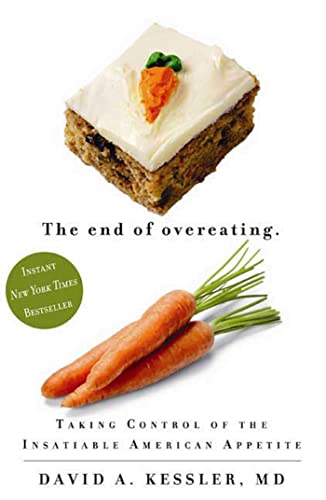 Anyway...
Anyway...The flap reads: "Most of us know what it feels like to fall under the spell of food - when one slice of pizza turns into half a pie, or a handful of chips leads to an empty bag. But it's harder to understand why we can't seem to stop eating - even when we know better. When we want so badly to say "no," why do we continue to reach for food."
Written by Dr. David Kessler, The End of Overeating is part food manufacturing expose, part biology lesson, and part impulse-control rehab.
I guarantee that after you read this book you'll only want to eat lettuce - for a while. Which might not be a bad thing, right?
So, why do so many of us overeat, and not just once in a while, but regularly? Well, according to Kessler, this isn't a will-power issue: the food industry is purposely setting out to make foods so yummy - or "hyperpalatable" - that our bodies are being biologically programmed by the industry's layering of fat on sugar on salt to eat more and more. The industry, whose number one priority is to make as much money as possible, is purposely manipulating our food so that resistance is futile.
Kessler's research is meticulous, and he even gets an anonymous food industry insider to give up the ghost on some of the secrets of food manufacturing. Kessler also talks to numerous researchers, obesity experts, and scientists who give him the low-down on the biology behind overeating and weight gain. It's fascinating stuff, actually.
The author also offers a rehabilitation plan for those amongst us who are "conditioned hypereaters." Interestingly enough, this is a cognitive behavioural approach that included many components of both CBT and the DBT I did a couple of years ago. Some of the impulse control and distress tolerance techniques are virtually the same as what Kessler describes in his Food Rehab(TM) program. This really piqued my interest, not only because it was already familiar to me in a different context, but because it's quite novel. This isn't a dietary solution and this isn't a will-power solution: this is a reprogramming of the brain solution. And, like recovering from BPD, it's hard, hard work.
Though this is packed with quite a bit of scientific and psychological information, Kessler does an excellent job of keeping this book readable. He avoids insider jargon and lingo, keeps his prose simple and to the point, and makes the sections in the book short and consise.
This book is definitely worth a read.

6 comments:
I'm always up for a good new read...I'll see if I can find it at the library. Thanks for the review :)
I've never heard of that cookbook. I'll have to see if the library has it. Thanks.
that book sounds interesting! It is true that most people tend to overeat and not know when to stop...
Cheers,
Rosa
Mmm Interesting. Over eating is a huge problem, but I think it's more of what we're eating and how often we eat it. And yes, there is some really interesting biological basis for sugar addiction in the brain, so that could be cause for over-eating.
But I do over indulge in some aspects, but try to eat normal :(
I find books like this really interesting. Especially doing what I do, I can easily see how food does cross the line from pleasure to compulsion. I'm putting it on my library queue!
I overdo it with chocolate. If I know someone at work has a candy dish I have to keep myself from eating too much.
Great review!
Post a Comment